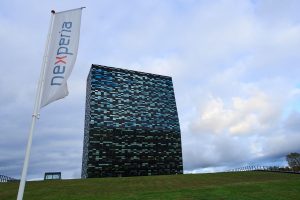HONG KONG (AP) — The Dutch government said Wednesday it’s relinquishing control of Chinese-owned chipmaker Nexperia, easing a standoff between China and the Netherlands that threatened supplies of semiconductors vital for global auto manufacturing.
Economics Affairs Minister Vincent Karremans said he was suspending an earlier order to take control of Nexperia under a rarely invoked Cold War-era law.
The Dutch government had cited national security concerns and “serious governance shortcomings” when it took effective control of Nexperia, which is headquartered in the city of Nijmegen but owned by China’s Wingtech Technology. Officials said they were trying to prevent the loss of crucial tech know-how that could threaten Europe’s economic security.
Nexperia chips are widely used by carmakers in North America, Japan and South Korea. Automakers warned in recent weeks that they were running low on the chips, and Honda was forced to shut down a factory in Mexico producing its popular HR-V crossover for North American markets.
Karremans said he was suspending his order issued in late September as a “show of goodwill” in a decision that came after “constructive meetings” with Chinese authorities over the past few days.
“In light of recent developments, The Netherlands has considered it the right moment to take a constructive step by suspending my order under the Goods Availability Act,” he said in a statement.
“We are positive about the measures already taken by the Chinese authorities to ensure the supply of chips to Europe and the rest of the world.”
China’s Commerce Ministry welcomed the decision, but said it’s only a “first step” in resolving the issue.
A Dutch court decision limiting Wingtech’s control over Nexperia “remains a key obstacle to resolving the issue”, the ministry said. It added both countries should continue to work together on the matter.
The dispute is an example of how Europe is caught between Washington and Beijing in their rivalry over trade and tech. Netherlands issued its seizure order after the United States last year put Wingtech on its “entity list” of companies that face export controls, and then expanded it in September to include subsidiaries including Nexperia.
The boardroom battle included the ousting of Nexperia’s Chinese CEO, and Wingtech founder, Zhang Xuezheng. American officials had told the Dutch government he should be replaced to avoid trade restrictions, according to a court filing.
Beijing responded by blocking the export of Nexperia chips from its Chinese factory in early October, a ban it lifted in recent days as part of the U.S.-China trade truce following U.S. President Donald Trump’s meeting with Chinese leader Xi Jinping.
Still, the company’s Chinese unit and its Dutch headquarters have continued to spar over supply of wafers from fabrication plants in Europe to its assembly center in China.
Despite Karremans’ announcement, the dispute is still not fully resolved, according to the companies.
Wingtech said that if the Dutch government has “the sincerity to solve the problem,” it should file a notice “explicitly withdrawing its support” for court proceedings that resulted in Zhang being suspended as CEO.
The court proceedings are a threat to Nexperia’s continuity and “therefore for the economic security of the Netherlands and Europe – which is the exact same argument the Dutch government made previously in support of judicial intervention.”
Wingtech said it strongly rejects accusations from Karremans that Zhang was behind “various acts of alleged mismanagement,” saying no proof has been provided.
Nexperia said the Dutch government’s announcement is a sign of significant progress but “full restoration of the supply chain requires active further cooperation of Nexperia’s entities in China.”
Nexperia was formerly part of Dutch electronics giant Philips and eventually purchased by Wingtech in 2018. It makes basic, standardized chips essential for running numerous automotive functions such as operating lights, airbag systems or anti-lock brakes. Modern cars can require hundreds of such components.
___
Kelvin Chan reported from London
By CHAN HO-HIM and KELVIN CHAN
AP Business Writers

